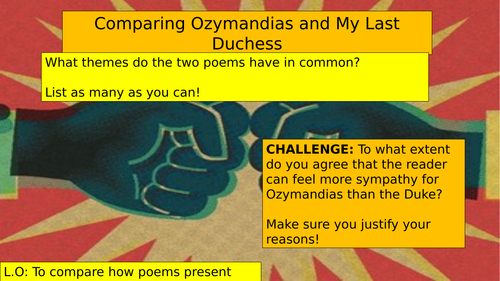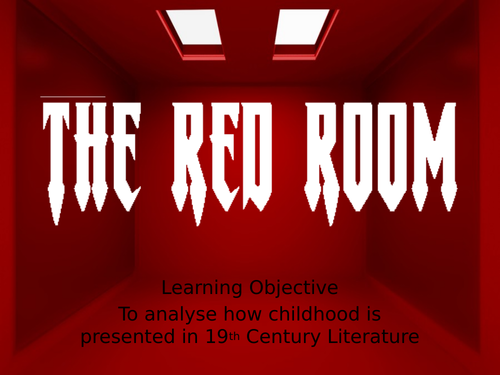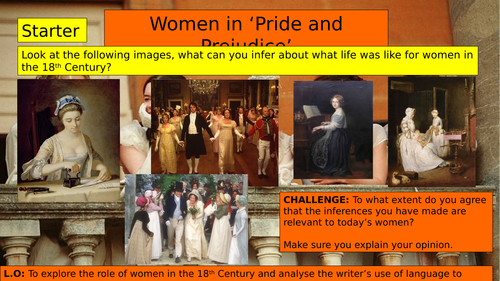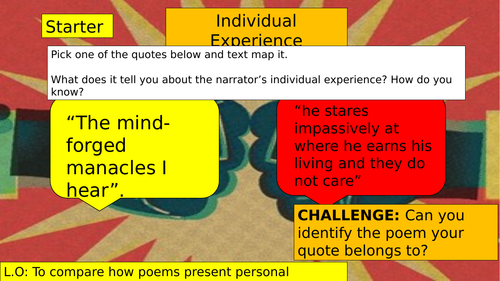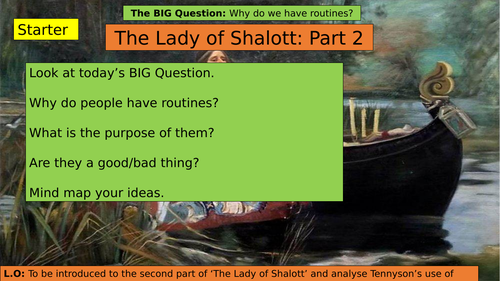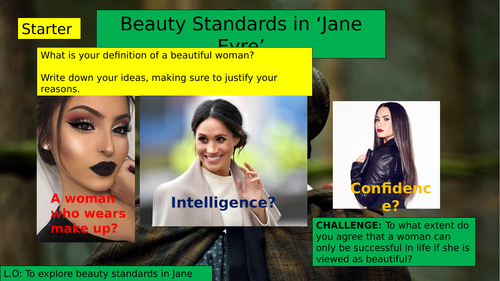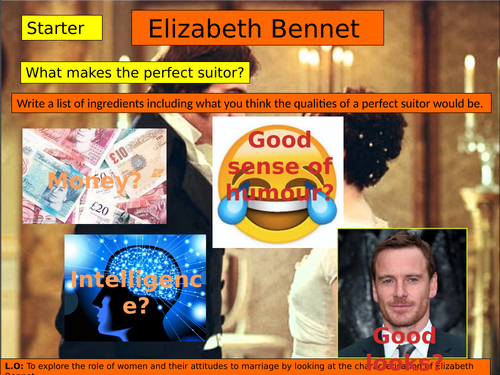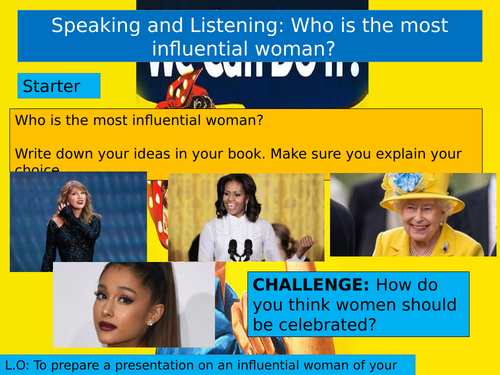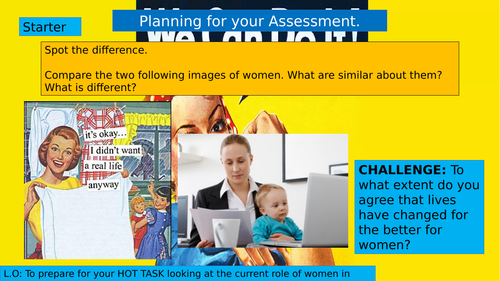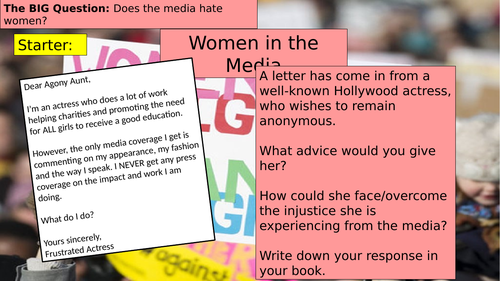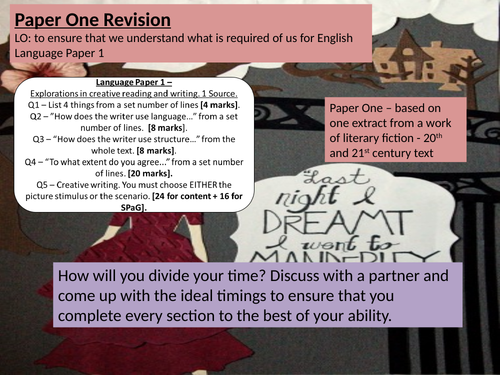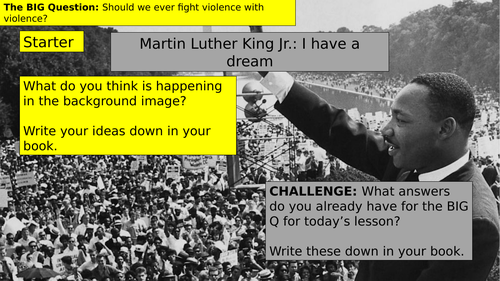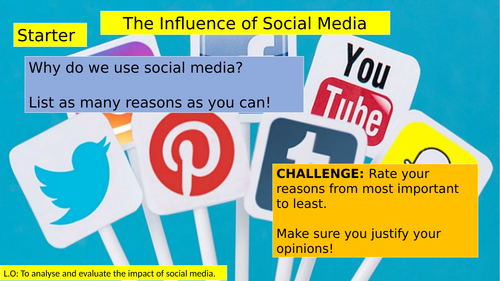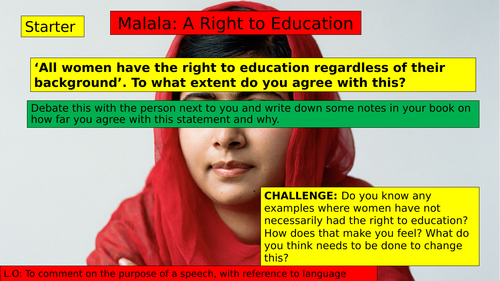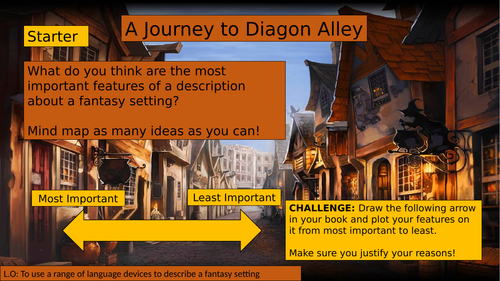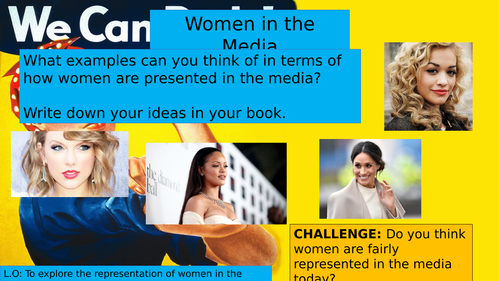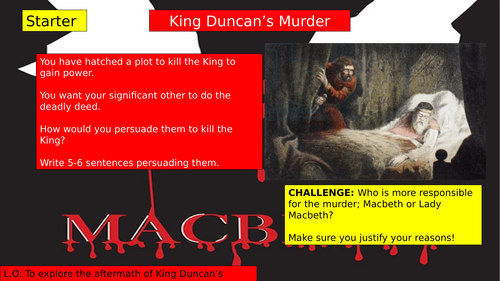60Uploads
19k+Views
4k+Downloads
All resources

AQA POWER AND CONFLICT POETRY: PRIDE
This is a GCSE lesson revision different types of pride in Ozymandias and My Last Duchess from the AQA Power and Conflict poetry cluster. The lesson features a range of activities that you can pick and chose from to suit your class. They range from pupils completing a table (included) to compare the two poems and the methods used by the poets to present pride; to a run through of each poem linking to the theme to then support pupils in writing a response to a GCSE question. This is easily adaptable for a KS4 class of any ability.

(KS3 7/8/9) The Red Room in 'Jane Eyre'
This is a lesson planned for a middle-ability Year 8 class looking at the role of female children and the Red Room in ‘Jane Eyre’. Pupils will debate the role of children before looking at the extract where Jane is forced into the red room. There is support provided to help pupils annotate the extract through group work and sentence starters to write a response about it. This lesson is easily adaptable for any KS3 class of any ability.

(KS3 7/8/9) Women in 'Pride and Prejudice'
This is a lesson planned for a middle-ability Year 8 class. It explores the role of women in Jane Austen’s time and how women are presented in ‘Pride and Prejudice’. The lesson encourages pupils to analyse key quotes and begin to explore Language Paper 1 Q2 skills with the extract. There is also a model text to support pupils with their analytical writing. This lesson is easily adaptable for any KS3 class of any ability.

GCSE POWER AND CONFLICT REVISION: INDIVIDUAL EXPERIENCE
This is a GCSE lesson revision on different types of individual experience that the AQA Power and Conflict poetry cluster explores. The lesson features a range of activities that you can pick and chose from to suit your class. They range from pupils completing a table to identify what poems link to different types of individual experience; to a run through of each poem linking to the theme to then support pupils in writing a response to a GCSE question. This is easily adaptable for a KS4 class of any ability.

KS3 (7/8/9) The Lady of Shalott Part Two
This is a series of lessons planned for a high-ability Year 7 class. The lessons focus on part two of the poem of ‘The Lady of Shalott’ and aims to ensure that pupils understand the language used by Tennyson to establish setting and the character of Lady Shalott. There are activities including creative writing, supporting pupils in picking out key language devices and how to analyse these in detail. There is then an extended writing activity supporting pupils in writing analytical paragraphs on the second section. This lesson is easily adaptable for any KS3 class of any ability.

KS3 (7/8/9) Writing a speech against injustice
This is a lesson planned for a high-ability Year 7 class looking at injustice. Pupils will write a speech persuading an audience to fight against injustice. There will be activities supporting them in creating arguments and embedding language techniques. The final activity will require students to write their speech and there are sentence starters included to support those who may struggle to start. This lesson is easily adaptable for any KS3 class of any ability.

GCSE POWER AND CONFLICT POETRY REVISION- TYPES OF CONFLICT
This is a GCSE lesson revision different types of conflict that the AQA Power and Conflict poetry cluster explores. The lesson features a range of activities that you can pick and chose from to suit your class. They range from pupils create tables to identify what poems link to different types of conflict; there is also a model text of the beginning of a comparison essay that pupils can highlight to identify the AOs and use to support their own writing.

(KS3 7/8/9) Beauty Standard in 'Jane Eyre'
This is a lesson planned for a middle-ability Year 8 class looking at beauty in ‘Jane Eyre’. Pupils will debate beauty expectations in the 19th Century before looking at key quotations exploring how Jane is described and the significance of Mr Rochester falling in love with her. There is support provided to help pupils write a paragraph on this through the use of a model text. This lesson is easily adaptable for any KS3 class of any ability.

Bertha from 'Jane Eyre' Diary Entry
This is a lesson for a middle-ability Year 8 class who were looking at Gothic literature. This lesson carries on from looking at an extract in ‘Jane Eyre’ where Bertha is finally revealed to the reader (see other Bertha lesson uploaded). The lesson requires pupils to imagine they are Bertha and write a diary entry detailing one of the days where she is locked inside the house/attic. There is an active activity where pupils can initially create a mime of Bertha, before they then plan and write their diary entry. Sentence starters are included to support pupils in their writing. This is easily adaptable for any KS3 or KS4 class.

(KS3 7/8/9) Elizabeth Bennet
This is a lesson planned for a middle-ability Year 8 class looking at Elizabeth Bennet. Pupils will debate the role of women in the 18th Century before looking at the extract where Elizabeth rejects Darcy. There is support provided to help pupils annotate the extract and sentence starters to write a response about it. This lesson is easily adaptable for any KS3 class of any ability.

Women in Society Speaking and Listening
These are a series of lessons planned for a middle-ability Year 8 class looking at who they think the most influential woman is. Pupils will research an individual of their choice and create a speech (perhaps a powerpoint too) on why their chosen individual deserves to win the award for ‘Greatest modern-day female contributor’. This lesson is easily adaptable for any KS3 class of any ability.

Women in Society Final Assessment
This is a lesson planned for a middle-ability Year 8 class looking at writing a persuasive speech giving a clear argument in response to a statement. Pupils will debate how important equal rights are and there are activities and a worksheet to help them plan their speech. There is then a success criteria and sentence starters to support them in writing their speech. This lesson is easily adaptable for any KS3 class of any ability.

KS3 (7/8/9) Speech on Women in the media
This is a lesson planned for a high-ability Year 7 class looking at injustice and how women are treated by the media. Pupils will write a speech arguing that women either are and aren’t fairly presented by the media. There will be activities supporting them in creating arguments and embedding language techniques. The final activity will require students to write their speech and there are sentence starters included to support those who may struggle to start. This lesson is easily adaptable for any KS3 class of any ability.

(KS4 10/11) Language Paper 1 Q1-4 'Rebecca'
These are a series of lessons planned for a middle-ability KS4 class. These lessons explore questions 1-4 of the Language Paper 1 exam individually. Pupils are able to practice writing responses to each question on an extract from ‘Rebecca’ (extract included). There are also tips and advice included on how to answer the questions and model texts to support pupils in writing their own answers. These lessons are easily adaptable for any KS4 class of any ability.

KS3 (7/8/9) Martin Luther King's 'I have a dream' speech
This is a lesson planned for a high-ability Year 7 class looking at injustice and analysing sections of the ‘I have a dream’ speech.There will be activities supporting them in picking out key quotes and language devices, before discussing these. Students will then focus on how to pick quotes apart and analyse these in detail, with examples to help. The final activity will require students to write an analytical paragraph exploring how the language used makes the speech persuasive. This lesson is easily adaptable for any KS3 class of any ability.

(KS3 7/8/9) Social Media Influences on Teenagers
This is a lesson planned for a middle-ability Year 9 class on the influence of social media. It asks pupils to consider the purpose of social media and consider pros and cons during group work. There is a newspaper article on the impact of social media on teenagers for them to analyse (this can be independent or pair or group work) before pupils then need to respond to a question showing both sides of the argument, A model text is included to support pupils in their writing. This is easily adaptable for any KS3 class of any ability.

(KS3 7/8/9) Malala's UN Speech
This is a lesson planned for a middle-ability Year 8 class looking at Malala’s story and her speech to the UN. Pupils will explore Malala’s story about the right to education and there is support to help them annotate key language features. There is support provided to help pupils write a response about it by using a model text. This lesson is easily adaptable for any KS3 class of any ability.

KS3 7/8/9 Harry Potter: Diagon Alley Description
This is a lesson planned for a middle-ability Year 8 class. It is a continuation lesson from a previous Harry Potter lesson where pupils looked at descriptions of Diagon Alley shops (see TES profile for this lesson). Pupils are now going to write a description imagining they have gone to Diagon Alley themselves and have visited a particular shop. There are images to help pupils gain initial ideas and a clip is included to help them begin to form descriptions. Group work is involved in the planning stages and roles of team leaders are available to pupils of a higher ability in the class. Worksheets are also included showing images of various shops. Each group can receive a set of images of one shop to focus their description on. This lesson is easily adaptable to any KS3 class of any ability.
Shops included:
Gringotts
Flourish and Blotts
Ollivander’s Wand Shop
Eeylop’s Owl Emporium
Madam Malkin’s Robes for all Occasions

(KS3 7/8/9) Women in the Media
This is a lesson planned for a middle-high ability Year 9 class. It explores the representation of women in the media, looking at an advert from the 1950s up to magazine covers from the modern day. Pupils can annotate these to explore key features and the effects they create. There is also an activity where pupils can compare male and female magazine covers and consider how the genders are presented in the modern day. To finish, pupils can look at how the media describe male and female celebrities and write an analytical paragraph on this. A model text has been written to support them in their writing. All short extracts, magazine covers and adverts are included with the powerpoint. This lesson can easily be split into two/three lessons and adapted for any KS3 class of any ability.

Macbeth: Duncan's Murder
This is a middle-ability Year 9 lesson focusing on the murder of King Duncan and Shakespeare’s presentation of Macbeth and Lady Macbeth during this. A short extract from the scene is explored in the lesson (the extract is included). Pupils are required to continue to focus on skills such as identifying and analysing a range of language techniques that Shakespeare has used and consider why he has used them. There is also an activity for pupils to be challenged further to closely analyse a quote to gain a range of interpretations. Lastly, there is the opportunity for creative writing to help them understand the characters further. Sentence starters are also provided to support them with their writing. This lesson is easily adaptable for a KS3 or KS4 class of any ability.

